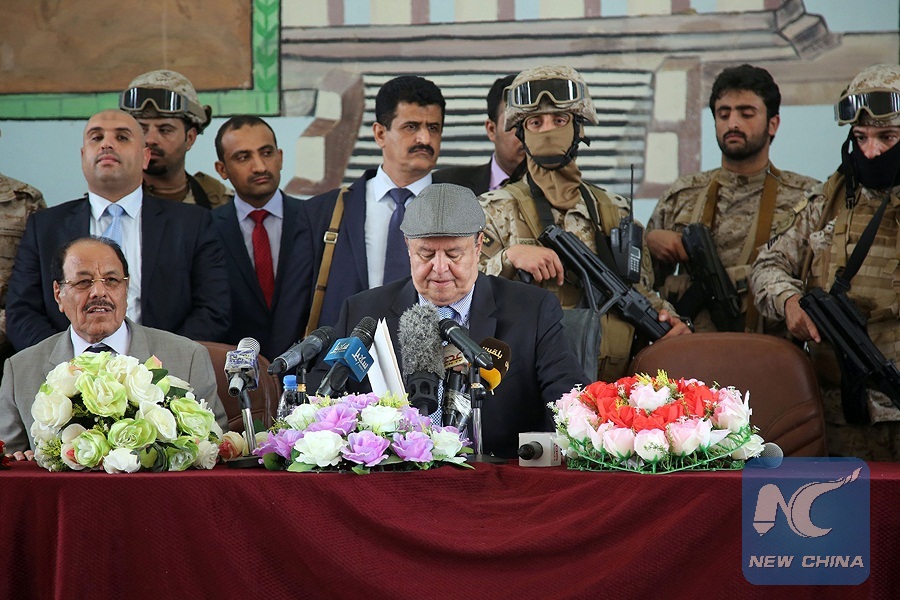
Yemeni President Abedrabbo Mansour Hadi (C) delivers a speech to army commanders and local officials during a surprise visit to inspect troops in Yemen's loyalist-held eastern city of Marib, on July 10, 2016. Hadi threatened to boycott peace talks with Iran-backed rebels if the UN envoy insists on a roadmap stipulating a unity government that includes the insurgents. (Xinhua/AFP Photo)
ADEN, Yemen, July 31 (Xinhua) -- The Yemeni government announced Sunday that its delegation to the Kuwait-based talks is ready to sign a UN-proposed agreement in a bid to bring security and stability to the war-torn Middle East country.
The Houthi delegates demanded the formation of a national government as a pre-condition to pursue the talks with the Yemeni government and refused to sign the UN deal, according to sources based in Kuwait.
The exiled government official news agency Saba said that "President Abd-Rabbu Mansour Hadi chaired a high-ranking meeting and announced his full acceptance of the UN-proposed roadmap."
A source close to Yemen's Presidency confirmed to Xinhua that "the country's legitimate political leadership officially approved the draft agreement presented by the United Nations that called for withdrawal of Houthi militias from Sanaa and other provinces."
The UN-proposed deal also demanded the Shiite Houthi group to release the political detainees and lift siege imposed on Yemeni cites within 45 days, the source said.
According to the Yemeni presidential official, the UN-proposed roadmap didn't address any political topics before completing its implementation and ending the ongoing military conflict in the country.
Yemen's Foreign Minister Abdul-Malik Mekhlafi, who heads the government delegation to the Kuwait-based talks, said on Twitter that he sent a letter to the UN envoy regarding his government's approval to the UN-proposed deal.
The Yemeni minister said that the UN-proposed deal suggested the canceling of the Revolutionary Committee and the Political Council established by Houthis and their allies in Sanaa.
He added that "We laid down only one pre-condition that Houthi militias and their allied forces sign the UN-proposed deal by August 7."
Sources based in Kuwait told Xinhua that there are huge differences in the visions of Houthis and the government regarding the draft resolution submitted by the United Nations.
According to the Kuwait-based sources, there are high expectations that Houthi delegates may withdraw from the peace consultations in protest against the UN-proposed deal.
A journalist close to the Houthi told Xinhua that "the United Nations submitted a paper just for discussions between the two delegations not for signing on it. The Saudi-backed delegation declare untrue claims."
The UN-proposed roadmap, agreed by the Yemeni government, was held up to ridicule by several pro-Houthi activists and politicians and described it as a "silly dream."
The Foreign Ministry of Kuwait announced Saturday that the UN-facilitated peace talks, aimed at ending nearly 16 months of civil war between Yemen's warring parties, have been extended for one week following a request by the UN special envoy.
According to a statement released by Kuwait official KUNA news agency "Kuwait, acting upon a UN request, extended the hosting of the Yemeni talks for another week to end on August 7."
The previous UN-facilitated negotiations aimed at ending a 16-month conflict ended without any results when the Saudi-backed government delegation decided to pull out.
On Friday, the Yemeni government said its participation in the UN-sponsored peace talks in Kuwait was over after Houthi rebels and political allies of ex-president Ali Abdullah Saleh signed a deal to set up a power-sharing council to govern war-shattered Yemen.
The UN envoy Ismail Ould Cheikh said Saturday after he managed to extend the faltering talks that he is "grateful for the hospitality of Sheikh Sabah Al-Ahmad Al-Jaber al-Sabah, Emir of Kuwait and approving talks extension for another week."
He added that "We hope that the delegations can utilize this remaining week to achieve progress on the path toward peace."
Kuwait, which has been hosting the Yemeni talks for more than 90 days, has previously given the Yemeni warring parties two weeks to reach a deal or leave its land.
The UN-brokered peace talks that started in Kuwait City on April 11 failed to stop the daily fierce fighting inside the Yemeni territories.
Delegates of the government strongly insist that they represent Yemen's sole legitimate governing authority, and call for the full implementation of last year's UN Security Council Resolution 2216.
The resolution orders Houthi militias to withdraw from Sanaa and all other cities occupied earlier, hand back weapons and release political prisoners before forming a new sharing transitional government.
However, the Houthis and their allies, for their part, say that they represent the country's de facto rulers and urged to form a new transitional government before discussing withdrawal from cities and the other topics.
The Houthi top leaders have also reaffirmed their demand for a consensus president to lead the transition in any peace deal, but government delegates have firmly rejected and insisted on implementation of the UN resolution first.
Houthis and Saleh's forces hold most of Yemen's northern regions while government forces backed by Saudi-led military coalition share control of the rest of the country, including seven southern provinces.
The civil war, ground battles and airstrikes have already killed more than 6,400 people, half of them civilians, injured more than 35,000 others and displaced over two millions, according to humanitarian agencies.

